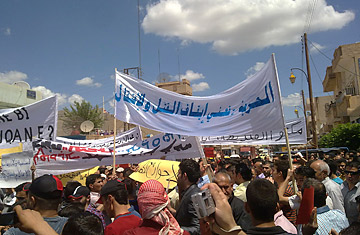
In this photograph, taken by a citizen journalist, antigovernment protesters attend a demonstration in the northeastern city of Qamishli on May 13
(2 of 2)
Amnesty is one thing. Some Syrians — like Abu Hamza, a rail-thin man with a wispy moustache — appear in no mood to excuse the regime for its repression. The young man, who asked that neither his name nor his hometown on the outskirts of Dara'a be mentioned, stood at the Jaber crossing (86 kilometers north of the Jordanian capital, Amman) waiting for a ride across the border back into Syria. A small black suitcase lay at his feet. The mobile-phone salesman said he hadn't been home since the uprising began and was worried about his family, given that landline and mobile-phone communication in many parts of Syria has been cut. "There's just been too much blood," Abu Hamza said as he lit a cigarette and peered out across a rain-drizzled patch of road. Several freight trucks crossed from Syria to Jordan, but there were precious few cars traveling in either direction. (Jordanian border guards at both the Jaber and Ramtha crossings say there's been a massive slowdown in traffic.) "We can't just forgive them for spilling so much blood," Abu Hamza said. "What was our crime? Tell me, what did we do to deserve this?" A Jordanian border guard looked at him sympathetically. "Inshallah kheir," the guard said, which roughly translates as "God willing, things will be good."
There are close blood, marital and trade ties straddling the border in these Sunni towns and villages. On Friday the previous week, hundreds of people from Ramtha marched to the border crossing to express their solidarity with friends and family in Dara'a. The protest was not repeated this week, although according to the local Jordan Times newspaper, many Ramtha residents have taken in Syrian refugees but are loath to publicize the hospitality, given their heavy reliance on trade with Syria. The daily quoted a 45-year-old Jordanian trader who said he had secretly taken in several Syrian members of his tribe but feared being blacklisted by Syrian authorities should they find out. "It's a shame, but our lives depend on traveling to Syria," he said. "This regime never forgets, and it doesn't look like it will fall either."
Back at the general store, Haithem al-Zaibe stood behind the counter of his cousin's shop. The 21-year-old from Ramtha also has family across the border in Dara'a, and says he wishes he could do something to help them. It's not as if he doesn't have time. Business is down 40%, he said, and before Abu Ibrahim rushed in, he hadn't seen a single customer for several hours. His Syrian family (several of whom own Jordanian SIM cards that have enabled them to maintain communications) are terrified to attempt to leave their home, let alone try and cross the border. "They're running out of food," he said. "I've seen Syrians park their cars out here," he gestured, pointing outside his store, "and smuggle bread, I've seen it with my own eyes. You won't believe where they hide it. Even milk, they will pour powdered milk into a bag and hide it in the undercarriage of their vehicle. They're desperate."
Abu Ibrahim, who had just hurried in and caught Zaibe's last comments, nodded his head. Cars are searched entering and exiting Dara'a, he said, not just for weapons, but for anything that may alleviate the people's suffering. A friend, he claimed, was detained for trying to smuggle in a dozen candles. "That was last month, and nobody's heard of him since," Abu Ibrahim said. "I have most of what I need now, I've hidden it. I have been reduced to acting like a thief, look at my hands! Look!" he said as he thrust his thick, greasy fingers forward. He wouldn't say where he'd hidden his food supplies, for fear that it would jeopardize further attempts. He looked down at his watch. It was almost noon. "I have to get there soon, before demonstrations start and I can't get back into the city," he said.
Zaibe handed the Syrian a bag full of flat, Arabic bread. "God be with you," he said, refusing payment. The stocky man thanked him, and quickly ushered his shy daughter out the door toward their white station wagon. It was an overcast, chilly day. The wind outside had picked up, kicking swirls of gritty sand into the air. "They're probably hoping for a storm to wash away all the blood in the streets," Abu Ibrahim said wryly, referring to the Syrian security forces. "They've butchered people," he said, shaking his head. "I'm telling you, they have butchered people."
